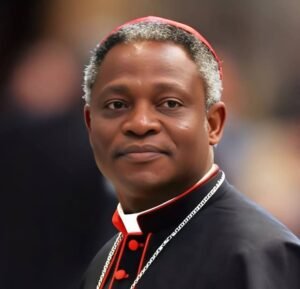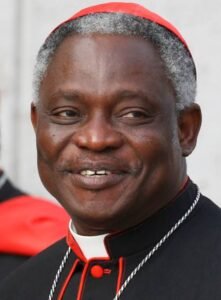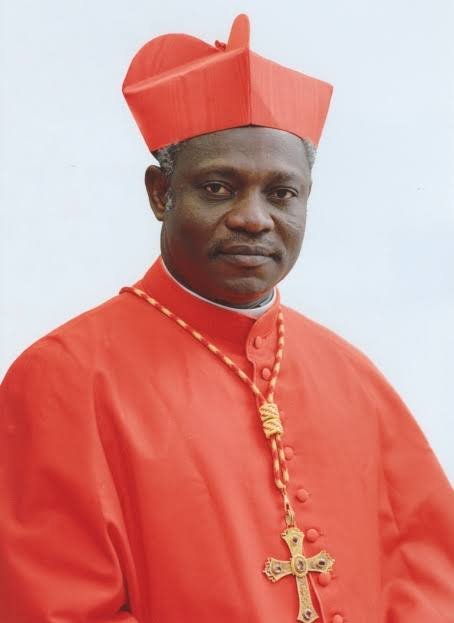The race for who becomes the next Pope following the demise of Pope Francis on Monday has begun. African Cardinal Peter Turkson is among the contenders. A Black pope would be unprecedented. But with obstacles can this be possible? African Catholics could comprise nearly one-third of the global Church, yet the top echelons of ecclesiastical power remain dominated by Europeans and, more recently, Latin Americans. Korede Abdullah in Lagos highlights the chances of Africa leading the Catholic Church in a lifetime.
By all measurable standards—experience, stature, intellect, and dedication—Cardinal Peter Kodwo Appiah Turkson of Ghana is papabile: a man widely considered capable of becoming pope.

As the first Ghanaian cardinal, a seasoned Vatican insider, and one of the Church’s most recognizable African voices, Turkson has long been on the global radar.
He has led key Vatican departments, including Justice and Peace and Human Development, and currently serves as the Chancellor of the Pontifical Academies of Sciences, reflecting the respect he commands within the Curia.
Yet, despite his credentials and periodic buzz about his candidacy during the papal transitions of 2005 and 2013, Turkson has never come closer to St. Peter’s throne than speculation and symbolism.
The question arises: why has the Catholic Church, with its vast and growing African population, never elected a pope from the continent?
Africa’s Paradox in the Catholic Church
Africa represents one of the most vibrant and fastest-growing centers of Catholicism. According to Missionary Africa, an online Chr journal, by 2050, African Catholics could comprise nearly one-third of the global Church, yet the top echelons of ecclesiastical power remain dominated by Europeans and, more recently, Latin Americans.
The symbolic and structural marginalization of African leadership in the Church is a paradox: the continent provides the faithful, but rarely the decision-makers.

Cardinal Turkson’s case underscores a broader systemic reality—the underrepresentation of Africans not just in religious spheres, but also across sectors like global health governance, academic leadership, sports administration, and economic policy-making.
This isn’t merely a matter of numbers; it’s a legacy of colonial attitudes, institutional inertia, and global perceptions of Black competence and leadership.
Western Perceptions and the Burden of Blackness
There is an unspoken glass ceiling in many global institutions—including the Church—when it comes to Black leadership. A Black pope would be unprecedented, and for some, uncomfortable.
Within and outside the Church, racialized perceptions about authority, intelligence, and spirituality often work against candidates from Africa, no matter how qualified.
Africa Health Report (AHR) findings show that the media coverage surrounding Turkson during the 2013 conclave veered from genuine interest to tokenistic curiosity, often focusing more on his skin color than his theology or diplomatic acumen.
This reflects a broader trend in the Western gaze: Black excellence is often seen as exceptional, not expected.
Whether in Nobel laureateship, leadership of global health organizations, or even football management, the Black individual often walks a path strewn with scrutiny and stereotypes.
Internal Disunity and Continental Challenges
Africa Health Report(AHR) also gathered that another obstacle to an African papacy is the continent’s internal disunity. Unlike Latin America or Europe, Africa lacks a cohesive ecclesiastical lobbying bloc. The diversity of languages, cultures, and even theological priorities among African bishops often dilutes their collective influence in conclaves.
This internal fragmentation contrasts with the more unified voting patterns of European cardinals, who often champion candidates from their own regions or shared ideologies.
Moreover, some African cardinals themselves have expressed hesitation about the feasibility of an African pope, fearing that the continent is not yet “ready” or unified enough to support such a monumental role. Ironically, this internal doubt sometimes feeds into external bias.
A Matter of Timing or a Matter of Will?
Cardinal Turkson remains one of the Church’s most capable figures. But his path to the papacy is more about the Church’s willingness to confront its own history than his personal merit.
The question isn’t whether an African can be pope—the real question is whether the College of Cardinals is ready to entrust the keys of Peter to someone from the periphery of old Christendom.
In a world increasingly attuned to equity, representation, and justice, electing an African pope would send a powerful message—not just of inclusion, but of transformation.
For now, though, Turkson remains a potent symbol of potential—a reminder that the center of Catholicism may be shifting southward, but the corridors of power have yet to catch up.
Until then, the papal throne remains both a spiritual summit and a mirror of our collective biases.



